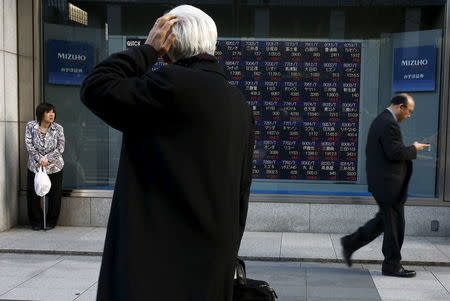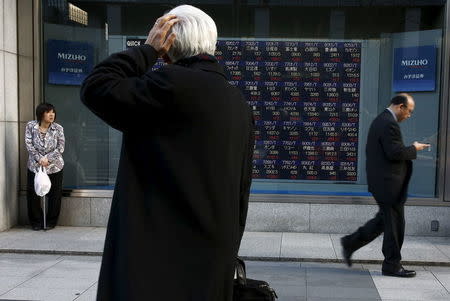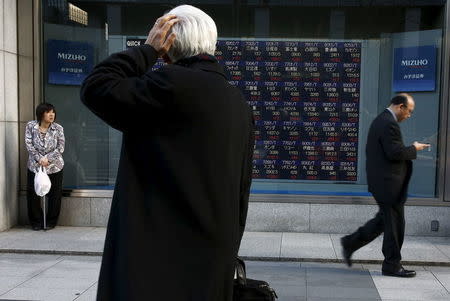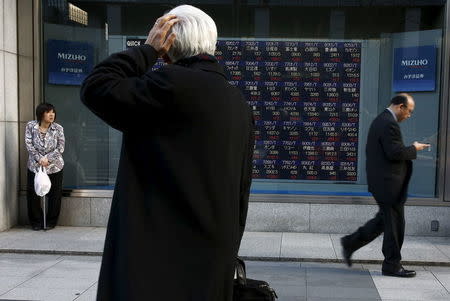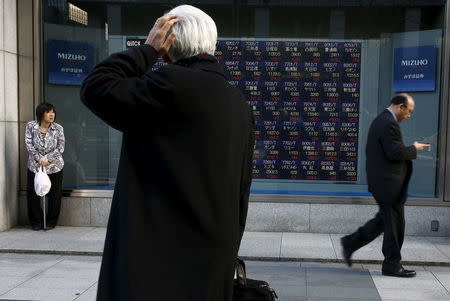Emerging markets lead stocks higher, Wall Street lags
By Dion Rabouin
NEW YORK (Reuters) - World stock markets touched a two-month high on Thursday, led by gains in emerging market stocks, as positive economic and political news soothed concerns about global growth and commodities prices extended their recovery.
A measure of emerging-markets shares <.MSCIEF> rose 1.4 percent for a fifth day of gains, its longest winning streak so far this year. Wall Street was modestly lower, but U.S. stocks have recovered notably from lows reached in February.
The MSCI emerging markets index was on track for its biggest weekly gain since October 2015, led by South African and Brazilian shares, which both rose to their highest in three months.
Stronger metals boosted South African stocks, with telecoms group MTN surging 9.5 percent.
Brazil's Bovespa index rose nearly 5 percent after news that could bolster a case to impeach President Dilma Rousseff. That encouraged investors who blame her administration's policies for driving Brazil into what could be its deepest recession ever.
"The market is betting Rousseff will not finish her mandate," said Pedro Tuesta, an economist with 4Cast in Washington D.C.
The rally in emerging markets overall has followed a cut in reserve requirements for Chinese banks earlier in the week, a move that analysts say could add $100 billion to the Chinese economy.
Commodities have surged in tandem with the return of risk appetite that has swept markets over the past two weeks. Copper prices hit their highest since November, backed largely by news of fresh stimulus from China. Copper was up 1.3 percent on the day.
China, the world's No. 2 economy and massive consumer of commodities, moved to cut banks' reserve requirement ratio earlier in the week, indicating a slight easing bias in its monetary policy. China accounts for nearly half of global copper consumption estimated at about 22 million tonnes this year.
"Emerging markets are outperforming developed markets this year to date, but it comes after a horrible 2015," said Win Thin, global head of emerging market currency strategy at Brown Brothers Harriman.
Emerging market stocks <.MSCIEF> fell nearly 17 percent in 2015, and more than 6.5 percent in January, as investors pulled back on riskier stock markets due to concern about weak demand worldwide. That concern was fanned by sharp falloffs in commodities prices, particularly oil.
Since then, oil has recovered some of its losses, though it still trades far below its average over the last year. On Thursday, Brent crude rose 0.2 percent to $37.01 and U.S. crude was down 0.2 percent to $34.60.
MSCI's world equity index <.MIWD00000PUS> rose 0.6 percent.
The Dow Jones industrial average <.DJI> fell 11.61 points, or 0.07 percent, to 16,887.71, the S&P 500 <.SPX> gained 0.24 points, or 0.01 percent, to 1,986.69 and the Nasdaq Composite <.IXIC> dropped 6.60 points, or 0.14 percent, to 4,696.82.
The U.S. non-manufacturing sector expanded at a slower pace in February from January, pushing down the dollar, which makes dollar-denominated commodities more attractive for non-U.S. firms when it falls.
The dollar index <.DXY>, which measures the greenback against six major rivals, was down 0.7 percent.
U.S. Treasury prices were flat as investors looked ahead to Friday's key employment report. A solid jobs report could bolster expectations that the Federal Reserve remains on track to raise interest rates later this year. The 10-year U.S. benchmark was down 3/32 to yield 1.85 percent.
(Reporting by Dion Rabouin, additional reporting by Claire Milhench in London and Bruno Federowski in Sao Paulo; Editing by Nick Zieminski and Bernadette Baum)


